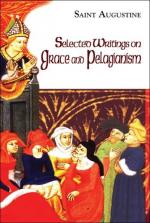|
This section contains 1,778 words (approx. 6 pages at 300 words per page) |

|
Pelagius was a spiritual adviser to Christian aristocrats in Rome around the turn of the fifth century CE. In a commentary on the Pauline epistles, a treatise On Nature, and other writings, he sought to bolster Christian asceticism by opposing Manichaean determinism and affirming human capacity to progress toward moral perfection. His moral character and theological insights attracted followers who defended and developed his teachings.
Opposition to Pelagius and his followers began to intensify after Alaric's sack of Rome forced them to emigrate. In 411 one of Pelagius's protégées, Caelestius, sought ordination to the priesthood in Carthage and instead was condemned for his views on the nature and effect of Adam's sin. In his defense, Caelestius appealed to the teachings of a priest named Rufinus, whom Caelestius had heard oppose the notion of inherited sin. Pelagius himself traveled quickly through North Africa to...
|
This section contains 1,778 words (approx. 6 pages at 300 words per page) |

|


